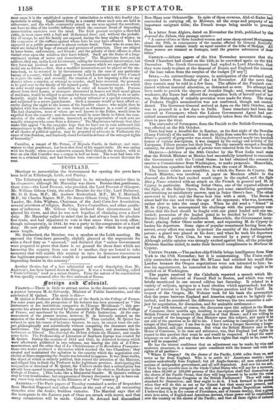SCOTLAND.
Meetings to memorialize the Government for opening the ports have been held at Edinburgh, Leith, and Paisley.
The Edinburgh meeting was brilliant in its attendance rather than in Ito eloquence; although Mr. Macaulay was there. Besides that gentleman, there were—the Lord Provost, who presided, the Lord Provost of Glasgow, Mr. William Gibson Craig, the other Member for the City, Lord Dalmeny, Mr. D. R. Ross, M.P., Mr. Andrew Rutherfurd, M.P., Mr. T. Maitland, M.P., Sir Charles Napier, M.P., Sir James Gibson Craig, Sir Thomas Dick Lauder, Mr. John Wigham, Chairman of the Anti-Corn-law Association, several ministers of religion, Bailies, Town-Councillors, and other gentle- men of influence. Mr. Gibson Craig declared that circumstances had altered his views, and that he was now hopeless of obtaining even a fixed duty. Mr. Macaulay called to mind that he had always been for absolute free trade, and had stipulated to vote in that sense when he took office; though subsequently, in 1841, he was a party to the compromise of a fixed duty. He now gladly returned to total repeal; for which he argued at some length.
Mr. Rutherfurd, the Member, was a speaker at the Leith meeting. He opposed the Corn-laws generally, slightly glanced at the arguments for even a fixed duty as "unsound," and declared that "unless Government were prepared to prove that there is no ground for those fears which are harassing the country from one end to another, they are bound to take measures that will enable this country to turn its immense resources to the legitimate purpose—their wealth to purchase food to meet the present impending famine in the country."
Another theatre, but of a less substantial and costly description than Mr. Anderson's, has been burned down at Glasgow. It was a wooden building, called " Cooke's Circus," used as a minor theatre. From the nature of its construction it was speedily consumed after the first outbreak of flames.


























 Previous page
Previous page